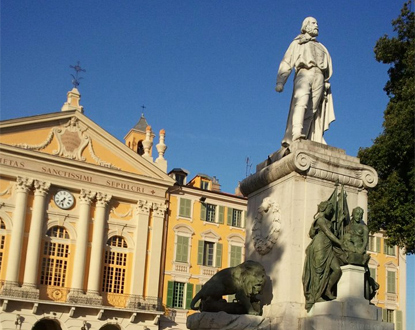Giuseppe Garibaldi (Joseph at birth) was born on July 4, 1807, and was baptized on July 19 at the Church of Saint-Martin and Saint-Augustin in Old Nice, where one can still see a copy of this certificate. He is undoubtedly one of the most important figures in Italian history: a testament to this is that he holds the record for being the most cited person in the streets and squares of Italian cities.
His success is mainly due to his adventurous life, his courage, and his invaluable visceral love for humanity, making him one of the protagonists of Italian history and beyond.
He is known as the “Hero of the Two Worlds” because he was engaged not only on the Italian peninsula but also in South America and throughout Europe to promote his ideals.
Giuseppe Garibaldi devoted his life to defending patriotic causes. During his exile in South America, he led his first major insurrectional fights, aided by a legion dressed in the now-famous red shirts.
He then fought against the Papal States and participated in the establishment of the Roman Republic (in 1849). The short-lived existence of the latter forced him to flee and leave his position as second-in-command of the patriotic army.
After taking refuge for a few years in the United States, upon his return to Italy in 1854, he raised an army and fought victoriously against Austria (1859), the Kingdom of the Two Sicilies during the famous expedition of the “Thousand” in 1860, and the campaign to liberate the southern territories of Italy, which allowed Victor Emmanuel of Savoy to found the Kingdom of Italy and become its King (1861).
Garibaldi then fought for France in 1870.
Retired in Caprera (north of Sardinia), he died on June 2, 1872.
He is considered one of the main architects of Italian unification. He was a fervent republican, and even though he had to accept the Kingdom of Italy, history has posthumously proven him right: today Italy is a Republic.
An interesting curiosity: Giuseppe Garibaldi had three nationalities, French at birth, then that of the Kingdom of Sardinia, and finally Italian.


